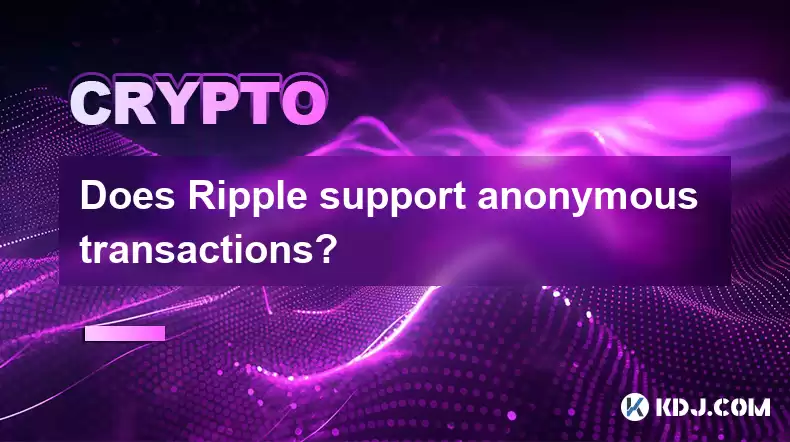-
 Bitcoin
Bitcoin $119700
0.53% -
 Ethereum
Ethereum $4508
5.39% -
 XRP
XRP $3.270
2.86% -
 Tether USDt
Tether USDt $1.000
0.00% -
 BNB
BNB $831.0
2.92% -
 Solana
Solana $189.6
6.89% -
 USDC
USDC $0.9999
-0.01% -
 Dogecoin
Dogecoin $0.2350
2.92% -
 TRON
TRON $0.3500
1.34% -
 Cardano
Cardano $0.8420
6.73% -
 Chainlink
Chainlink $23.26
8.42% -
 Hyperliquid
Hyperliquid $44.42
1.44% -
 Stellar
Stellar $0.4512
3.16% -
 Sui
Sui $3.895
5.15% -
 Bitcoin Cash
Bitcoin Cash $618.7
5.88% -
 Hedera
Hedera $0.2601
4.43% -
 Ethena USDe
Ethena USDe $1.001
0.01% -
 Avalanche
Avalanche $24.45
4.90% -
 Litecoin
Litecoin $128.1
5.41% -
 Toncoin
Toncoin $3.454
1.64% -
 UNUS SED LEO
UNUS SED LEO $9.065
0.44% -
 Shiba Inu
Shiba Inu $0.00001359
3.41% -
 Uniswap
Uniswap $11.42
1.78% -
 Polkadot
Polkadot $4.165
6.36% -
 Cronos
Cronos $0.1664
-0.50% -
 Ethena
Ethena $0.8108
1.79% -
 Dai
Dai $1.000
0.00% -
 Pepe
Pepe $0.00001213
5.22% -
 Bitget Token
Bitget Token $4.438
0.25% -
 Aave
Aave $313.3
5.02%
Does Ripple support anonymous transactions?
Ripple (XRP) transactions are pseudonymous, not anonymous; linked to addresses, not identities. While privacy-enhancing techniques exist, complete anonymity is unlikely due to the public ledger and regulatory scrutiny. Understanding this distinction is crucial.
Mar 08, 2025 at 01:41 pm

Key Points:
Ripple (XRP) is not designed for anonymous transactions like Monero or Zcash.
Transactions on the XRP Ledger are pseudonymous, meaning they are linked to addresses, not directly to individuals.
While not fully anonymous, techniques exist to enhance privacy, though these have limitations.
Regulatory scrutiny and the inherent nature of blockchain technology make complete anonymity on Ripple unlikely.
Understanding the difference between pseudonymous and anonymous is crucial when considering Ripple's privacy features.
Does Ripple Support Anonymous Transactions?
The short answer is no, Ripple (XRP) does not inherently support anonymous transactions in the same way as privacy-focused cryptocurrencies like Monero or Zcash. Transactions on the XRP Ledger are recorded on a public, distributed ledger. This means all transactions are visible to anyone who chooses to examine the ledger. However, the information isn't directly tied to real-world identities.
While not anonymous, Ripple transactions are considered pseudonymous. This means that transactions are linked to wallet addresses, not directly to individuals' names or other personally identifiable information (PII). Each user has one or more XRP addresses, which act as identifiers for their holdings and transactions. This offers a degree of privacy, but it's far from true anonymity.
Several techniques exist that individuals might attempt to use to improve their privacy when using XRP. However, it's crucial to understand that none of these guarantee complete anonymity and all carry significant risks.
Using multiple addresses: Creating and using several XRP addresses for different purposes can make it more difficult to trace the flow of funds back to a single individual. This adds layers of obfuscation but doesn't provide anonymity.
Using mixers or tumblers: These services aim to mix XRP from multiple users, making it harder to track the origin of funds. However, using such services carries risks, including the potential for scams and the possibility of attracting regulatory scrutiny. The effectiveness of mixers is also constantly being challenged by advancements in blockchain analytics.
Employing privacy-focused wallets: Some XRP wallets offer features designed to enhance privacy, such as enhanced transaction privacy options. However, these features are often limited and do not offer true anonymity. The inherent transparency of the XRP ledger ultimately limits their effectiveness.
The public nature of the XRP Ledger and the increasing sophistication of blockchain analytics tools make it incredibly difficult to achieve true anonymity when using XRP. Furthermore, regulatory pressure and compliance requirements increasingly necessitate a higher level of transparency in cryptocurrency transactions. Exchanges and financial institutions often require KYC (Know Your Customer) and AML (Anti-Money Laundering) compliance, limiting the ability to use XRP anonymously for illicit activities.
The design of the XRP Ledger prioritizes speed and efficiency over complete anonymity. The trade-off between speed, scalability, and privacy is a key consideration in the design of any blockchain. Ripple's focus has been on creating a fast and efficient payment system, rather than a system that prioritizes complete user anonymity. This choice reflects its intended use cases, primarily focusing on cross-border payments and institutional adoption.
The pursuit of complete anonymity in cryptocurrency transactions often presents a challenge to regulatory bodies and law enforcement agencies. The potential for using cryptocurrencies for illegal activities such as money laundering and tax evasion necessitates measures to track and monitor transactions. Therefore, the development of truly anonymous cryptocurrency systems is often met with resistance from regulators. The tension between privacy and security is a constant theme in the cryptocurrency space.
Furthermore, the concept of "anonymous" transactions is often misunderstood. While some cryptocurrencies claim anonymity, it's important to understand that true, untraceable transactions are extremely difficult, if not impossible, to achieve on any public blockchain. Even with advanced privacy techniques, skilled analysts can often trace transactions back to their origin with sufficient effort and resources.
The information available on the XRP Ledger, while not directly linking transactions to individuals, still provides a substantial amount of data that can be analyzed to identify patterns and potential connections. This is a fundamental aspect of the technology and cannot be entirely circumvented.
Frequently Asked Questions:
Q: Is Ripple completely traceable?
A: While Ripple transactions are pseudonymous, not anonymous, meaning they are linked to addresses, not identities, advanced analysis can reveal patterns and potentially link transactions to individuals, particularly with sufficient data and resources.
Q: Can I use Ripple for illegal activities?
A: No. Using Ripple for illegal activities like money laundering is risky and likely to result in legal repercussions. Exchanges and financial institutions employ KYC/AML measures.
Q: What is the difference between pseudonymous and anonymous?
A: Pseudonymous means transactions are linked to addresses, not identities. Anonymous means transactions are untraceable to any individual. Ripple is pseudonymous; it is not anonymous.
Q: Are there any truly anonymous cryptocurrencies?
A: While some cryptocurrencies aim for anonymity, achieving complete untraceability is incredibly challenging due to the nature of blockchain technology and ongoing efforts in blockchain analytics. Claims of complete anonymity should be approached with skepticism.
Q: Can I improve my privacy when using Ripple?
A: Techniques like using multiple addresses can offer some level of increased privacy, but they do not guarantee anonymity. Using privacy-enhancing tools may also carry risks. Complete anonymity on Ripple is not possible.
Disclaimer:info@kdj.com
The information provided is not trading advice. kdj.com does not assume any responsibility for any investments made based on the information provided in this article. Cryptocurrencies are highly volatile and it is highly recommended that you invest with caution after thorough research!
If you believe that the content used on this website infringes your copyright, please contact us immediately (info@kdj.com) and we will delete it promptly.
- Unich's OTC Exchange: Surging with $1.2B Volume – What's the Hype?
- 2025-08-13 02:50:11
- MoonBull's Explosive Moves: Your Crypto Whitelist Ticket to Ride!
- 2025-08-13 02:30:11
- MAGACOIN Finance: Don't Miss the Presale Bonus!
- 2025-08-13 02:30:11
- Trump's Crypto Kingdom: $2.4 Billion and Counting
- 2025-08-13 02:50:11
- Solana, LSTs, and SEC Approval: A New Dawn for Crypto?
- 2025-08-13 02:55:12
- Bitcoin's Profit Surge: Unpacking the BTC Value Boom
- 2025-08-13 02:55:12
Related knowledge

How to purchase Aragon (ANT)?
Aug 09,2025 at 11:56pm
Understanding Aragon (ANT) and Its PurposeAragon (ANT) is a decentralized governance token that powers the Aragon Network, a platform built on the Eth...

Where to trade Band Protocol (BAND)?
Aug 10,2025 at 11:36pm
Understanding the Role of Private Keys in Cryptocurrency WalletsIn the world of cryptocurrency, a private key is one of the most critical components o...

What is the most secure way to buy Ocean Protocol (OCEAN)?
Aug 10,2025 at 01:01pm
Understanding Ocean Protocol (OCEAN) and Its EcosystemOcean Protocol (OCEAN) is a decentralized data exchange platform built on blockchain technology,...

How to invest in Kyber Network Crystal v2 (KNC)?
Aug 12,2025 at 05:21pm
Understanding Kyber Network Crystal v2 (KNC)Kyber Network is a decentralized liquidity hub built on the Ethereum blockchain that enables instant token...

Where can I buy UMA (UMA)?
Aug 07,2025 at 06:42pm
Understanding UMA and Its Role in Decentralized FinanceUMA (Universal Market Access) is an Ethereum-based decentralized finance (DeFi) protocol design...

What exchanges offer Gnosis (GNO)?
Aug 12,2025 at 12:42pm
Overview of Gnosis (GNO) and Its Role in the Crypto EcosystemGnosis (GNO) is a decentralized prediction market platform built on the Ethereum blockcha...

How to purchase Aragon (ANT)?
Aug 09,2025 at 11:56pm
Understanding Aragon (ANT) and Its PurposeAragon (ANT) is a decentralized governance token that powers the Aragon Network, a platform built on the Eth...

Where to trade Band Protocol (BAND)?
Aug 10,2025 at 11:36pm
Understanding the Role of Private Keys in Cryptocurrency WalletsIn the world of cryptocurrency, a private key is one of the most critical components o...

What is the most secure way to buy Ocean Protocol (OCEAN)?
Aug 10,2025 at 01:01pm
Understanding Ocean Protocol (OCEAN) and Its EcosystemOcean Protocol (OCEAN) is a decentralized data exchange platform built on blockchain technology,...

How to invest in Kyber Network Crystal v2 (KNC)?
Aug 12,2025 at 05:21pm
Understanding Kyber Network Crystal v2 (KNC)Kyber Network is a decentralized liquidity hub built on the Ethereum blockchain that enables instant token...

Where can I buy UMA (UMA)?
Aug 07,2025 at 06:42pm
Understanding UMA and Its Role in Decentralized FinanceUMA (Universal Market Access) is an Ethereum-based decentralized finance (DeFi) protocol design...

What exchanges offer Gnosis (GNO)?
Aug 12,2025 at 12:42pm
Overview of Gnosis (GNO) and Its Role in the Crypto EcosystemGnosis (GNO) is a decentralized prediction market platform built on the Ethereum blockcha...
See all articles

























































































